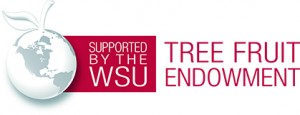News Articles
Metamitron: a new thinning agent for WA apples and pears
Chemical thinning can be tricky, even when you have a lot of experience with a given product. Here are some things we have learned in…
Using Insect Growth Regulators as a Tool in Pear IPM
Insect growth regulators can be used as a tool as part of a pear IPM.
Prepare for the season. Management of mildew and rot pathogens in apple and pear orchards
The petals and senescent floral parts are susceptible to infections from post harvest pathogens. Plan to start your post harvest management sprays at petal fall.
Watch for Fire Blight Risk
If we have warm temperatures and moisture during bloom be prepared to prevent fire blight infections. Consider the following reminders.
Cherry Cold Hardiness Model on AWN
Predicting hardiness levels of perennial fruit plants is essential for frost management. Because sweet cherry (Prunus avium) is among the earliest to initiate development in…
Sitio web nuevo sobre abejas melíferas y polinizadoras
Los apicultores cuya primera lengua es el español ahora tienen un recurso de conocimiento para mantener saludables a los polinizadores: Abejas melíferas y polinizadoras .…
AgWeatherNet Spray Guide: Tool to Optimize Pesticide Applications in Washington
To help agricultural spray applicators and the community, AgWeatherNet (AWN) has developed a weather data and station-specific forecast driven decision support tool called Spray Guidance.…
OSU Extension publication – Guide to identifying serious virus phytoplasma symptoms
Cherry virus and virus like organism publication from OSU.
An Update on the WSU Cherry Breeding Program
The cherry breeding program at Washington State University is excited to report on some of the key outcomes of our work since the relaunch of…
WSU Decision Aid System Update March 2025
Welcome to DAS 2025 Updates.
